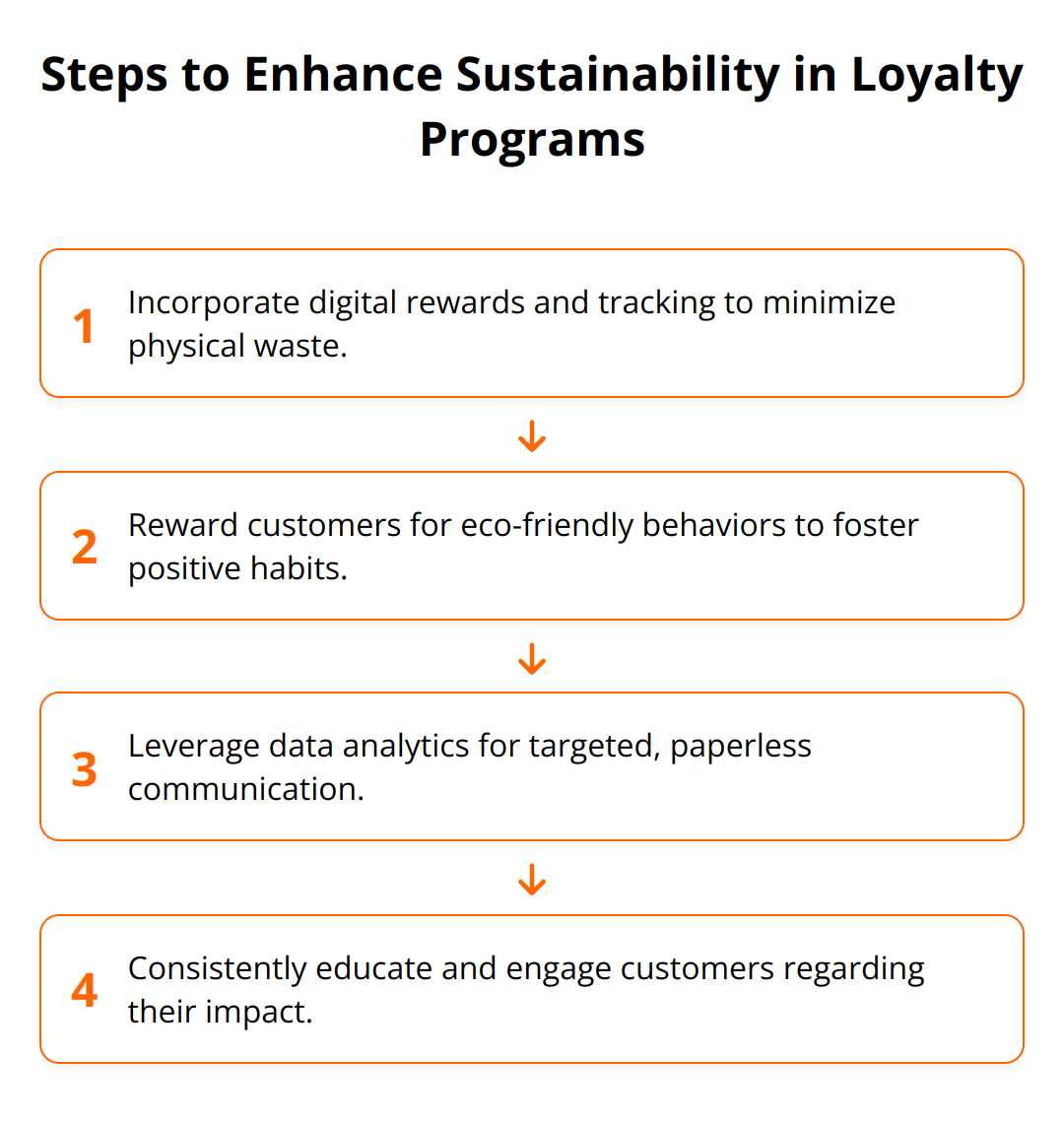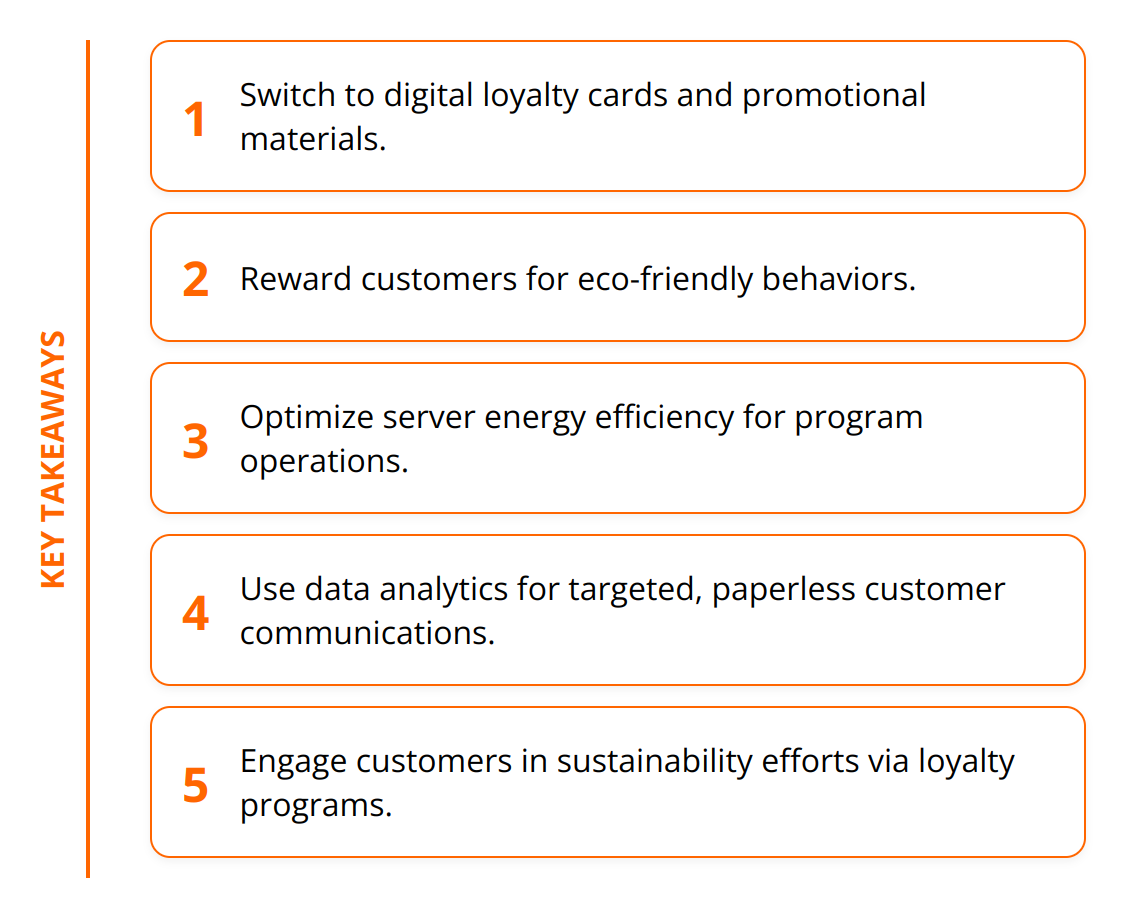
We at Reward the World believe that the shift towards sustainable loyalty programs is not just a trend but a necessary evolution in how businesses engage with their customers. Traditional loyalty programs often come with a hefty environmental cost, from the physical production of rewards to energy-intensive operations. However, embracing sustainability can significantly enhance a brand’s reputation, cut costs, and support corporate social responsibility initiatives. In this blog post, we’ll provide practical guidance on making loyalty programs more eco-friendly.
Reducing Environmental Footprint
The environmental cost of running traditional loyalty programs is higher than many of us might think, particularly when you consider the carbon footprint of physical loyalty cards, the waste generated by promotional materials, and the energy consumed by program operations. It’s time for businesses to acknowledge these impacts and take actionable steps toward more sustainable practices.

Physical loyalty cards, while small, have a surprisingly large environmental impact. Millions are produced annually, consuming vast amounts of plastic and paper, contributing significantly to global waste and carbon emissions. Additionally, the promotional materials often used in these programs, such as flyers, posters, and packaging, exacerbate the problem by generating more waste, much of which is not recycled. The operation of loyalty programs is also resource-intensive, with servers running 24/7 to keep the program running smoothly, further increasing the program’s carbon footprint.
However, moving toward sustainability is not just an ethical choice; it’s also a smart business strategy. Here are some actionable steps businesses can take to mitigate these impacts:
- Switch to Digital: Opt for digital loyalty cards and promotional materials. Not only do they reduce waste, but they’re also more convenient for customers.

- Educate and Engage: Use your loyalty program to educate customers about sustainable practices and engage them in eco-friendly actions.
- Optimize Operations: Evaluate and optimize the energy efficiency of the servers and data centers that support your loyalty program.
Furthermore, integrating sustainability into loyalty programs can significantly enhance a brand’s appeal, especially among younger demographics who prioritize environmental values in their purchasing decisions. Businesses that adapt to these changing consumer expectations not only benefit the planet but also build stronger, more meaningful connections with their customers.
For businesses looking to learn more about creating sustainable loyalty programs, our posts on loyalty program best practices and the evolution of loyalty programs provide further insights and strategies.
In conclusion, the move towards sustainable loyalty programs is essential. It reflects a growing awareness of the environmental impacts of business practices and aligns with the evolving expectations of consumers. By adopting more eco-friendly practices, businesses can significantly reduce their environmental footprint while enhancing customer loyalty and brand reputation.
Why Go Sustainable?
Sustainable loyalty programs are more than just a way to reduce environmental impact; they offer tangible benefits that can drive business growth and bolster customer relations. At the heart of transforming loyalty programs to be more eco-friendly lies the potential for dramatically enhancing brand reputation and customer loyalty, cutting operational costs, and furthering corporate social responsibility (CSR) goals. Each of these areas, when strategically addressed, can deliver measurable value.
Building a Better Brand Image
Today, consumers are increasingly aligning their spending with their values, particularly when it comes to sustainability. Businesses that demonstrate a genuine commitment to environmental stewardship are seen not only as market leaders but as part of a vital global effort to promote responsible consumption. This alignment significantly enhances brand reputation and fosters customer loyalty. Importantly, this isn’t just about attracting customers; it’s about creating brand advocates who believe in what a company stands for. This shift from consumer to advocate is invaluable, fostering a deeper connection that transcends transactional loyalty.

Reducing Costs via Digital Innovation
Switching to digital platforms for loyalty programs is a masterstroke for businesses aiming to be sustainable. Digital loyalty cards and rewards are not just eco-friendly; they significantly reduce the costs associated with printing, distributing, and replacing traditional physical materials. Moreover, digital platforms provide a wealth of data that can be used to optimize marketing strategies and personalize customer experiences. These operational efficiencies ultimately lead to reduced costs, making a compelling case for the digital transformation of loyalty programs. For businesses considering this shift, exploring best practices in digital loyalty can offer valuable insights.
Advancing CSR Goals
Corporate social responsibility has evolved from a nice-to-have to a business imperative, and sustainable loyalty programs play a critical role in advancing these goals. They offer a practical means for businesses to operationalize their CSR commitments, engaging customers in sustainability initiatives that have a direct impact. Whether it’s through incentivizing sustainable behaviors or supporting environmental causes, these programs can significantly enhance a company’s contribution to global sustainability efforts. Additionally, CSR-focused loyalty programs can help attract and retain talent, with many employees placing a high value on working for organizations committed to social and environmental responsibility.
In summary, the move towards sustainability in loyalty programs is not just beneficial but essential for businesses aiming to stay relevant in a rapidly evolving market. The combination of enhanced brand reputation, operational efficiencies, and the advancement of CSR goals creates a compelling case for businesses to adopt sustainable practices in their loyalty programs. By doing so, they not only contribute to a healthier planet but also build stronger, more loyal customer relationships and achieve significant cost savings.
How to Make Loyalty Programs Greener
Adopting green practices within loyalty programs represents a significant stride towards sustainability while fostering deeper customer relationships. The transition from traditional approaches to more eco-friendly strategies requires thoughtful planning and execution. Below, we explore practical ways businesses can revitalize their loyalty programs with sustainability at their core.
Shift to Digital Platforms
The first step towards an environmentally friendly loyalty program is moving away from physical cards and materials. Digital loyalty platforms not only reduce waste but also offer enhanced personalization and convenience for both businesses and customers. For example, apps can track customer preferences and behavior in real-time, allowing for tailored rewards and communication. This digital shift reduces the need for paper-based marketing materials, significantly cutting down on waste and carbon emissions. Businesses can streamline this transition by adopting digital loyalty solutions that integrate seamlessly with existing systems, ensuring a smooth changeover for customers.
Reward Eco-Friendly Behavior
Incentivizing sustainable actions through a loyalty program can change customer habits over time. Businesses can offer rewards for actions such as bringing reusable bags, cups, or opting for digital receipts over paper ones. For instance, coffee shops could give bonus points to customers who bring their reusable cups. This not only reduces waste but also encourages customers to participate actively in sustainability efforts, strengthening their loyalty to the brand. It’s a clear win-win: businesses promote environmental stewardship while customers enjoy additional benefits, reinforcing positive behavior through tangible rewards.
Utilize Data for Precision
Leveraging data analytics for customer communication is another cornerstone of sustainable loyalty programs. Instead of broad, paper-based marketing campaigns, businesses can use customer data to send targeted offers and information, drastically reducing the need for physical materials. Personalized, paperless communications via email or mobile apps resonate more effectively with customers, ensuring that messages are both seen and appreciated. This approach minimizes waste and enhances marketing efficiency, making it an indispensable tool for any loyalty program aiming to reduce its environmental footprint.

- Personalize communications: Use customer data to send relevant offers and information, cutting down on unnecessary mailings.
- Monitor engagement: Regularly review which eco-friendly rewards and behaviors have the highest engagement rates to refine and improve your offerings.
- Educate your customers: Use your digital platforms to share information about sustainability efforts and how customers can contribute.
By embracing these practices, businesses can align their loyalty programs with the values of modern consumers, who increasingly prefer brands that take a stand on environmental issues. Moreover, adopting green practices can lead to cost savings, enhance brand reputation, and contribute to a healthier planet. For those looking to delve deeper into optimizing their loyalty programs, our insights on enhancing customer experiences can offer additional strategies for success.
Through committed efforts to green loyalty programs, companies not only boost their standing in the eyes of eco-conscious consumers but also set a benchmark in their industries, leveraging sustainability as both a competitive advantage and a cornerstone of brand identity.
Wrapping Up
Sustainability in loyalty programs is more than just an approach; it’s a necessity in today’s business landscape. As we have discussed, the shift towards these eco-friendly practices not only helps in reducing the environmental footprint but also significantly boosts brand image, customer loyalty, and operational efficiencies. The benefits are clear: a sustainable loyalty program can cut costs, deepen customer relationships, and drive business growth. Moreover, by prioritizing corporate social responsibility, companies can align with the values of a growing segment of the market that prefers to engage with brands demonstrating a genuine commitment to the environment.

Here are some practical tips for businesses ready to take their loyalty programs in a sustainable direction:
- Move loyalty schemes to digital platforms.
- Reward customers for eco-friendly behavior.
- Use data analytics for precise and personalized marketing.
- Continuously track and refine green initiatives based on customer feedback.
- Share educational content on sustainability through loyalty program channels.
By implementing these steps, businesses can create loyalty programs that not only appeal to environmentally conscious consumers but also offer a competitive edge in their respective industries. Making loyalty programs greener isn’t just about responding to current trends; it’s about setting a course for future success—financially, socially, and environmentally.
We at Reward the World encourage businesses of all sizes to adopt sustainable practices within their loyalty programs. Our platform offers a robust solution for enhancing customer engagement through digital rewards, making it easier for companies to implement green strategies and achieve their CSR objectives. With proven capabilities in fostering customer loyalty and enhancing brand value, our platform can help your business transition to more sustainable practices seamlessly. For more insights and strategies on making your loyalty program more eco-friendly, explore our comprehensive guide on eco-friendly rewards.
In conclusion, the importance of integrating sustainability into loyalty programs cannot be overstated. It’s a strategic move that benefits the environment, the community, and the bottom line. Forward-thinking companies that recognize this will not only lead in their markets but will also contribute to a healthier planet for future generations. Now is the perfect time for businesses to take meaningful steps towards sustainability, and we’re here to help make that transition as smooth as possible.

